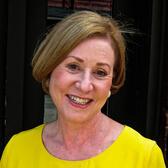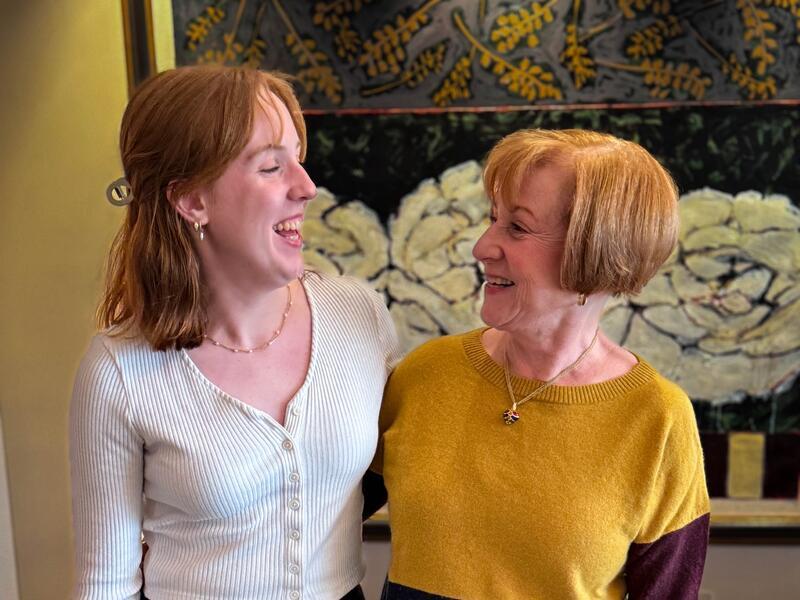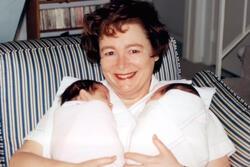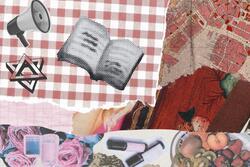L’dor Vador: A Legacy of Love
Watching faded 8 mm films, I see my fourth birthday party. I am wearing a conical party hat and I am surrounded by happy faces. Among the guests, there is a distinguished older man with beautiful, wavy white hair who is smiling as he watches me play with the tea set he has just given me.
A month later, he dies. The last of my four grandparents has now passed.
Forty years later, I visit a friend’s family compound and watch her daughters joyously run from parents to grandparents, back and forth, again and again in a playful game. I feel a growing awareness that the bond between children and grandparents—and their unconditional love— has a spacious, sacred quality. I ache for the grandparents I never had during my childhood, and I vow things will be different if I am blessed with grandchildren someday.
February 22, 2008. My husband Steve and I nestle into our cozy, warm bed as a powerful Nor’easter approaches Boston. A warm intimacy settles between us, when the phone rings. Our son tells us he and his wife are on the way to the hospital, but we should not come yet. I look at Steve and say, “Let’s get dressed…I’m not letting a snowstorm keep me from the birth of my first grandchild. I don’t care if we sit in the waiting room all night.”
Forty-five minutes later, Steve and I are in the hospital waiting room when our son Elliot comes out and says Barbara, our daughter-in-law, has given birth. They name her Lucy, and the three of them want some time alone as a new family. A short while later, Elliot comes to tell us that Lucy is going to be wheeled into the nursery, and we should wait near the dimly lit swinging doors. Moments later, the nurse pushes the crib through the wide doors and pauses. I gaze at Lucy and exclaim with delight, “Oh, my God, she is beautiful!” This is the first utterance in my new role as grandmother. Yes, it was love at first sight, and yes, she was beautiful. The moment was filled with a sense of awe at the miracle of this new life and a wellspring of unbounded love.
Now, as her Jewish grandmother—her only Jewish grandmother—I have a role to play as someone who loves Lucy unconditionally and who can link her to her Judaism to help her Jewish identity grow. L’dor vador—from generation to generation.
Rabbi Abraham Joshua Heschel wrote, "Our goal should be to live life in radical amazement," and Lucy’s birth awakens that goal within me. This perfect infant is a miracle. So I dedicate myself to intentionally grandparenting this new child; to assuming the sacred honor of passing on cultural traditions, holidays, and values. I want to be a blessing in her life, and I hope in time I will be blessed by her.
The Torah tells me to remember what I have seen and make it known to my children and my children’s children. This commandment guides me in becoming a grandparent who will nourish Lucy with spiritual knowledge. Judaism and unbounded grandparent love are interwoven into this sacred choice that will guide my path.
April 5, 2008. There is no Jewish ritual to mark the rite of passage into the role of grandparent, so I collaborated with Mayyim Hayyim (Boston’s community mikveh) to create a ceremony to mark the transition.
I asked Barbara, my daughter-in-law, to be my witness for the mikveh immersion ceremony I created. And so, holding six-week-old Lucy, Barbara watches me descend the mikveh steps to declare my intentions as I transition into this new and wonderful role.
As a toddler, Lucy sits nestled into my arms as I read aloud to her. We read the classics, like Goodnight, Moon, and Jewish children’s books like It Could Always Be Worse, Joseph Had An Overcoat, Shabbat Princess, and The Matzo Man. During these warmhearted moments, I am weaving love, literature, and legacy into binding threads, which I pray will last a lifetime.
October 18, 2013. I love Heschel’s term “radical amazement"; it is the “wow” factor that brings joy to our daily life. And so, I intentionally notice the wow when I am with Lucy. Driving her home from kindergarten one fall afternoon, I pull the car over and exclaim “WOW,” pointing toward the trees. Autumnal colors are on glorious display. “Isn’t that amazing?!,” I joyfully exclaim, hoping she will begin to notice a world greater than her still small, blessed world.
December 20, 2017. I am looking for Hanukkah gifts for Lucy and her younger brother, Griffin. I enjoy shopping for toys, games, and clothes, but I consciously choose not to try to rival Christmas. I am, after all, the Jewish grandmother. I want my gift-giving to be rooted in values. I want to plant the seeds of tzedakah, charitable giving to those in need, so that my grandchildren grow to embrace social responsibility (achrayut, in Hebrew).
And so, my Hanukkah tradition begins: a few presents, and among them an envelope. The envelope contains a gift certificate with directions to choose the charity of their choice, to which I will donate in their names. I remind Lucy and her brother that they are deeply blessed—by love, good health, and privilege—and they need to take time to think about others who are not as fortunate. Gratitude (hakarat HaTov) and compassion (rachamim) are seeds I want to plant early, so that their spirits can grow. Even more, I want to instill in them an awareness of the broader world—the brokenness and the beauty.
April 10, 2018. Ten-year-old Lucy and I travel to New York to visit Ellis Island and the Tenement Museum. At the museum, we visit the 1902 apartment where an immigrant Jewish family lived. We learn about the kosher meat boycott that was organized by the women in these tenements, in response to rising prices for kosher meat. History, women asserting themselves, and Lucy's own lineage are linked together in this visit, building connection to our shared history, part of an unbroken chain. I believe seeing and experiencing this tenement will connect her to her Jewish past and her legacy. Although Lucy is still young, I believe this visceral experience will have a lasting impact on her soul.
As the years pass, I continue to consciously create experiences and conversations that are self-reflective and relate to others and society. When I sit with Lucy, now a sixth grader, we talk about her subjects. In social studies, she will be learning about world religions. “I hope the teacher does Judaism first – it came before Christianity and Islam.” Lucy begins to read the day’s assignment, which discusses the spiritual dimension of religion. It notes how this dimension is hard to prove scientifically, is beyond measurement, and how ritual and tradition makes certain objects sacred. She struggles a bit trying to put the brief explanation in her own words, as required by the assignment. We begin to talk.
I remind her of Heschel’s term “radical amazement” that we spoke about years earlier—the wow. "Think about when you were at Glacier National Park—the big open sky, the fluffy clouds, the massive mountains…the beauty that is beyond words. The feeling that something is vast, special, beyond the ordinary. That is what the spiritual dimension is. We experience it, even if we can’t describe it. Do you ever feel it at camp?” I ask. Lucy nods yes.“ Sometimes at Havdalah around the lake.” She sits quietly. “We can’t prove there is a God," I tell her, "but we can experience a sense of connection to something amazing, bigger than we are. To me, that experience is what I call God.” I do not probe her for descriptions. I just let the moment be; I let the mysterious peaceful silence settle into the room.
I feel a deep sense of amazement. I am sitting in my 11½-year-old granddaughter’s room having a discussion about spirituality and God. I pause for a second and think: We are talking about things that are beyond words, things felt and experienced. Since the day of Lucy’s birth, our lives have been intertwined with a seamless giving and receiving that brings us here to this moment. I am filled with wonder and a sense of peace. This moment feels sacred, here and now.
February 22, 2025. I cannot call Lucy today to wish her a happy seventeenth birthday. Unplugged, on a ten-day wilderness expedition in the canyons of Utah, she is exploring the natural world on a semester-long program combining rigorous academics and experiential learning. In a brief email, she wrote, “This place is amazing!” evoking our past conversations about “radical amazement.”
Over the years, I have integrated holidays, history, gratitude, tzedakah, and compassion into my role as grandparent. And as a result, Jewish values— by words and by deeds— have formed the tapestry of Lucy’s life. In a recent article about teens leading change, published in Reform Judaism, Lucy was interviewed about her work empowering voter engagement, although she herself was not old enough to vote. “One of the most important Jewish values to me is tikkun olam, repairing the world," she said. "My passion for social justice stems from being in Jewish communities that highlight and prioritize making the world a better place."
What a gift to be Lucy’s grandmother. To witness her moments of struggle and her unbridled joy; to laugh, cry, and grow together. What a blessing to accompany Lucy on her journey.
That is what I had always longed for—and our journey continues to evolve. I know the bond between a grandparent and grandchild is a wonderful experience, but cultivating it with a sacred quality—and with Jewish meaning—has nourished me beyond measure.
The world is full of crisis and strife, but it is also full of courage and love, and the desire to live. My love for my granddaughter fills me with joy, spans the centuries, and connects me to hope for the future.
“The day we were born was the day God decided the world could not exist without you,” wrote Rebbe Nachman of Breslov.
That is Lucy’s gift to me.








I wrote the Shabbat Princess for my daughters who were then little girls and are now in college - delighted to hear it was part of your beautiful journey with your granddaughter.
Beautiful story! I too was blessed with a wonderful and loving Grandmother. Although she did speak in Jewish words and phrases her values were. Her motto was “Giving is Living” which she taught to all her family and friends till the day she passed away .